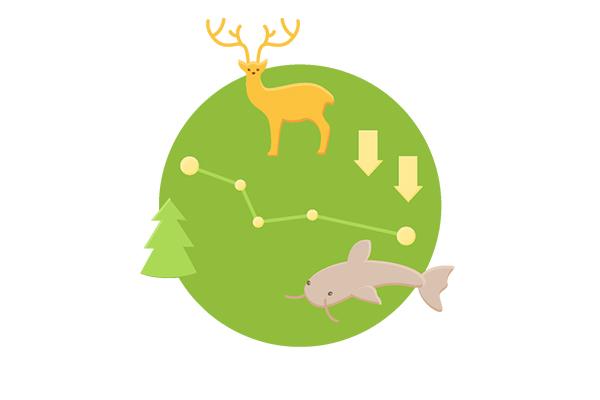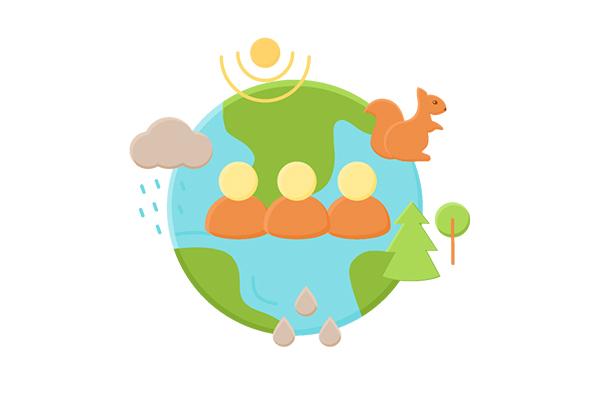In 2022, 196 countries agreed to halt and reverse biodiversity loss by 2030 under the Kunming-Montreal Global Biodiversity Framework. This is a historic deal for nature and a breakthrough for conserving and restoring biodiversity, and ensuring its sustainable use.
Progress has been made since the agreement, yet biodiversity is being destroyed at an unprecedented rate. Human actions are destroying healthy ecosystems, and consequently threatening our food security, resilience to climate change, and clean air, water and soils.
Decisive action within this decade is critical to make peace with nature. The EU is therefore committed to the full and swift implementation of the Global Biodiversity Framework.
What’s at stake? Life on Earth as we know it...
Biodiversity is about saving our life support systems. Healthy biodiversity means healthy people, food and water security. Nature is also our best ally in tackling the climate crisis.
Right now, we’re destroying nature faster than ever. If we don’t change track, all of humanity will be put at risk.
Find out more about why nature needs you and we need nature too.

1 million species are at risk of extinction

Humans have radically changed ¾ of the Earth’s surface

75% of the world’s crops depend on pollinators

Half of global GDP depends on nature
Global goals and targets
The Global Biodiversity Framework has clear, measurable goals and targets, with complete monitoring, reporting, and review arrangements to track progress. It is complemented by a robust resource mobilisation package.
The deal will also significantly increase finance for biodiversity from all sources (domestic, international – both public and private) mobilising at least USD 200 billion per year by 2030. It further aims to reduce incentives, including subsidies, harmful to biodiversity by at least USD 500 billion per year by 2030.
A new Fund established under the Global Environment Facility is open to financing from all sources. A new multilateral mechanism to share benefits arising from the useout of digital sequence information on genetic resources and contribute to mobilize resource was also established and should be operationalised through a decision at COP 16.
- Restore 30% of all degraded ecosystems globally (on land and sea)
- Conserve and manage 30% of land, waters and seas (terrestrial, inland water, and coastal and marine areas)
- Halt human induced extinction of threatened species and ensure recovery and conservation of species
- Reduce risk from pesticides by at least 50%
- Reduce nutrients lost to the environment by at least 50%
- Reduce pollution risks and negative impacts of pollution from all sources to levels that are not harmful to biodiversity and ecosystems
- Reduce theglobal footprint of consumption
- Sustainably manage areas under agriculture, aquaculture, fisheries, and forestry including by substantially increasing agroecology and other biodiversity-friendly practices
- Minimise the impact of climate change, including through nature-based solutions
- Reduce the rate of introduction and establishment of invasive alien species by at least 50%
- Secure the safe, legal and sustainable use and trade of wild species
- Increase benefit sharing from the use of genetic resources to support biodiversity conservation and its sustainable use
Implementation
All countries must implement the Global Biodiversity Framework through domestic and international action.
The EU is committed to the full and swift implementation of the Framework. The Commission has submitted the EU’s targets to implement the Framework, which cover all goals and targets, describing how the EU plans to achieve them, and linking to relevant legislative and non-legislative policy instruments at EU level.
The European Commission will host one of the centres for technical and scientific cooperation, and is setting up, together with our partners, a Global Knowledge Support Service for Biodiversity. The EU remains committed to double external financing for biodiversity.

EU at COP16
CBD COP16 is taking place in Cali, Colombia, 21 October - 1 November 2024. A full programme of events on transformative actions to deliver on the Global Biodiversity Framework is taking place at the EU Pavilion. Find out more about the EU's position and aims for COP16 in the Council Conclusions.
Before CBD COP16, all countries were required to prepare updated National Biodiversity Strategies and Action Plans or national targets and National Biodiversity Finance Plans. The next COPs will consider if the cumulative impact of the national actions is sufficient to reach the global goals and targets for 2030 and 2050.

The EU is leading by example and will double external funding for biodiversity to 7 billion euros.
A comprehensive plan to put Europe’s biodiversity on a path to recovery by 2030
The first ever law to bring to life Europe’s degraded ecosystems
To make sure European consumption does not cause deforestation in other countries
A commitment to plant at least 3 billion additional trees in the EU by 2030
A framework and concrete measures to protect and restore soils, and ensure that they are used sustainably
EU cooperation
The EU cannot solve the current crisis alone – all countries need to join forces. There is high public support for for leaders to take bold action for climate, nature and people.
The EU is working with many partners to implement international commitments. Before COP15, Commission President Ursula von der Leyen endorsed the Leaders' Pledge for Nature, committing to halt and reverse biodiversity loss. The Commission also joined the High Ambition Coalition for Nature and People - an intergovernmental coalition supporting an ambitious framework.
Related News
It is presenting a proposal on how to integrate the landmark international Biodiversity Beyond National Jurisdiction (BBNJ) Agreement into EU law.
Talks in Brussels with the UN Environment Programme centred on advancing a competitive circular economy and enhancing water resilience.
Talks restarted in Rome this week after a failure to reach an agreement in Cali, Colombia, last year.









